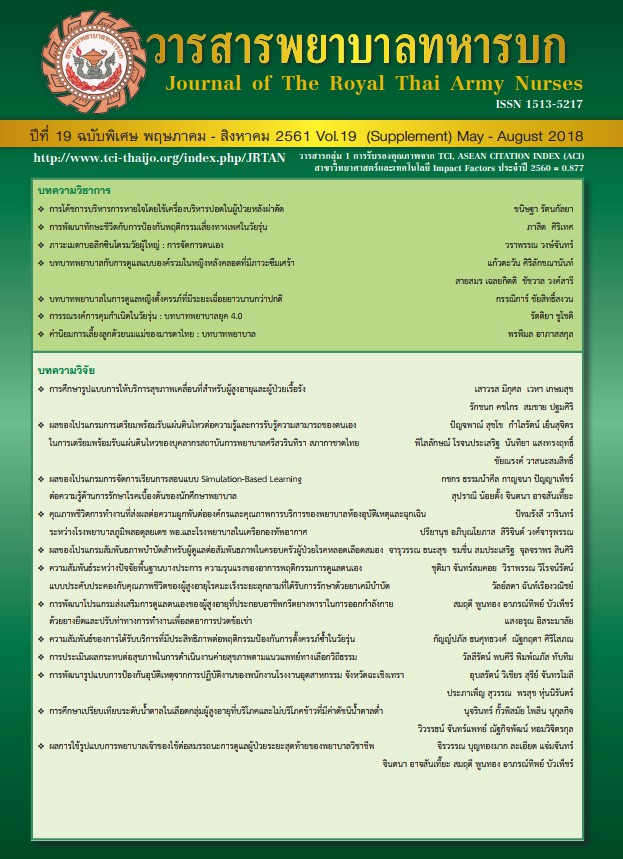Effect Of Primary Nursing Model Using On The End Of Life Care Of Nurse’s Competency
Keywords:
Terminal patients, End of Life Care, Nurse’s Competency in End of Life Care, The Primary Nursing Care SystemAbstract
The purpose of this quasi-experimental research was to study the effect of the nurse’s competency in end of life care with the primary nursing care system.The sample included professionals nurses working in In patient department and department of the elderly at St. Louis Hospital and had experienced in end of life care 3 – 5 years of 30 purposive sampling people. Research instruments were the handbook of developing nurse’s competency in end of life care with the primary nursing care system and the nurse’s competency in end of life care with the primary nursing care system.Both instruments were tested for content validity of questionnaire by 3 experts with CVI.92 and reliability coefficient Alpha was 0.963. Analyze data with descriptive statistics and pair t-tests statistical for before and after tested. The results revealed that the nurse’s competency in end of life care after used the primary nursing care system was a high level ( = 4.15, SD = .44) and nurse’s competency in end of life care after used the primary nursing care system was a high level before used using the system was statistically significant .05 level.
Downloads
References
World Health Organization. Definition of Palliative Care; 2013.
World Health Organization. The 10 leading causes of death in the world;2015.
National Statistical Office . Statistical trends elderly. Bangkok: National Statistical Office; 2016. (in Thai).
Ministry of Public Health. The national economic and social development plan no. 10 B.E; 2007. (in Thai).
Kurat S., Parakho P. & Suwannakoat S. End of Life Care : a new dimension that challenge the role nurses. Nonthaburi : Praboromarajchanok
Institute Office of the Permanent Secretary Ministry of Public Health; 2013. (in Thai).
Wasi P.Speech honors sumalee conference habitually 1st about Palliative Care and medicine with the heart of a human being. Phra Nakhon SI Ayutthaya Province. Journal of Preventive Medicine Association.2009; 3(2):299-308. (in Thai).
Surachai Chumsriphan. Saint Louis Hospital Report .Bangkok: Saint Louis hospital; 2017. (in Thai). 9. Saint Louis hospital. A history of the Saint Louis hospital. Bangkok: Saint Louis hospital; 2016. (in Thai)
Watts & O’leary. Primary nursing: a mode of care or a philosophy of nursing .Journal of Nursing. 1999; 29(3): 584-591.
Johnsen AT, Petersen MA, Pedersen L, Groenvold M. Symptoms and problems in a nationally representative sample of advanced cancer patients. Palliat Med. 2010; 23(6): 491-501.
Smith S. N., & Bohnet N. Organization and administration of hospice care. The Journal of Nursing Administration.1983; 13(11):10-15.
Srisatidnarakul B. The methodology in nursing research. 4th ed. Bangkok: U & I inter media; 2007. (in Thai)
Nursing and Midwifery Council. Palliative care service system. Nonthaburi: Nursing and Midwifery Council; 2016. (in Thai)
Butsaban O.The Development of Primary Nursing System in Surgery Department at the Tertiary Level Hospital in Ratchaburi Province [Dissertation]. Nakornprathom : Christian University; 2014. (in Thai)
Deeying S. Effect of primary nursing on quality of end of life patient [Dissertation], Bangkon : Chulalongkorn University;2011.(in Thai)
Sawasdeenarunat W., Taneerat A. & Wisettharn T. The Development of Palliative Care Model for Terminal Cancer Patients at Maharaj Nakhon
Si Thammarat Hospital. Journal of Nursing, Ministry of Public Health. 2015; 25(1):144-158. (in Thai)
Paorohit W. & Booncharoenpanich S. Quality of life of air force retirees and families with chronic illness received palliative care. Journal of the Royal Thai Army Nurses. 2017; 18(3): 244-250. (in Thai).
Phongchamnan, S. Developed for professional qualification in nursing infants, a tertiary hospital. Medical Service Department Bangkok [Dissertation]. Nakornprathom: Christian University; 2558 . (in Thai).
Downloads
Published
How to Cite
Issue
Section
License
บทความหรือข้อคิดเห็นใดใดที่ปรากฏในวารสารพยาบาลทหารบกเป็นวรรณกรรมของผู้เขียน ซึ่งบรรณาธิการหรือสมาคมพยาบาลทหารบก ไม่จำเป็นต้องเห็นด้วย
บทความที่ได้รับการตีพิมพ์เป็นลิขสิทธิ์ของวารสารพยาบาลทหารบก
The ideas and opinions expressed in the Journal of The Royal Thai Army Nurses are those of the authors and not necessarily those
of the editor or Royal Thai Army Nurses Association.






